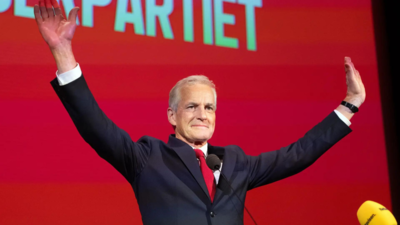ARTICLE AD BOX

Norwegian Prime Minister Jonas Gahr Stoere won a second term in office on Monday after his ruling Labour Party came out on top with around 28% of the vote, which enabled him to remain in power with the support of four other left-wing parties.In a closely-fought parliamentary election after surviving years of turmoil in his cabinet and a rebellion within his party, the 65-year-old, at least for now, can maintain his position after a parliamentary election which saw issues like rising living costs at home and chaos in international politics taking center stage."This is a signal to outside Norway that social democracy can also win despite a right-wing wave," Stoere told a jubilant crowd of Labour supporters chanting "four more years."The Labour party alongside four, smaller left-leaning parties, secured 87 seats, with 99% of the votes counted. That's two more than the minimum needed to secure a majority, but down from a combined 100 seats in 2021.On the right, the populist Progress Party, the center-right Conservatives and two smaller groups looked set to win the remaining 82 seats. Nevertheless, Progress Party managed to double its score from the 2021 election.
"Tonight, we are going to celebrate the best score in our history, and my goal is for this to be just the beginning," Progress Party leader Sylvi Listhaug said. What were the issues dominating the elections in Norway?The campaigns by the political parties centered around domestic issues like inflation, abolition of wealth taxes and the quality of public services.Apart from these topics, the tumultuous state of international politics because of the war in Ukraine, US President Donald Trump's tariffs and Israeli policy in Gaza, were also heavily discussed.Observers had predicted that the uncertainty in global politics would also give the ruling Labour Party an edge due to voters' perceived desire for the stability of an incumbent government.



.png)
.png)
.png)
















 6 hours ago
5
6 hours ago
5







 English (US) ·
English (US) ·